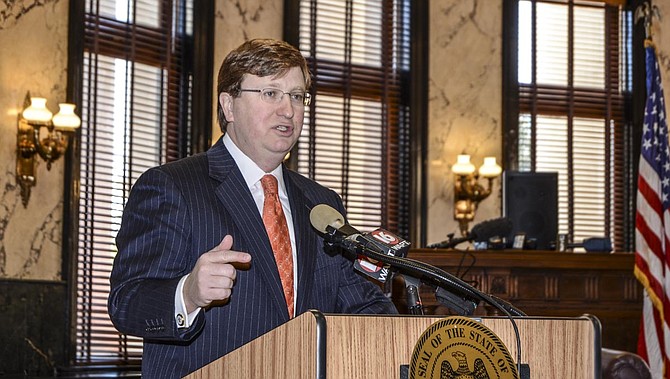Lt. Gov. Tate Reeves prefers leaving kids' eye health to private nonprofits than expanding Medicaid, which covers vision services. Photo by Trip Burns.
What a new report says is that Mississippians would benefit greatly from the expansion of Medicaid. But what the report really means is that Mississippians—and the rest of the country—are suffering great harm by the state's refusal to expand Medicaid.
In "Missed Opportunities: The Consequences of State Decisions Not to Expand Medicaid," researchers from the White House Council of Economic Advisers examined 22 states that have declined to loosen Medicaid eligibility requirements to insure more citizens.
"These 22 States have seen sharply slower progress in reducing the number of uninsured over the last year and a half, and researchers at the Urban Institute estimate that, if these States do not change course, 4.3 million of their citizens will be deprived of health insurance coverage in 2016," the report's authors write.
In Mississippi, expanding Medicaid would provide an additional 139,000 people with insurance, the lack of which is a major barrier to people going to the doctor. Increasing health-care access would also mean 19,800 fewer people would struggle with paying their bills due to high medical costs. The overall physical and mental health of people living in Mississippi would also improve, the report finds.
Vikki Wachino, acting director of the Center for Medicaid and CHIP Services, said the Obama Administration, which championed the Affordable Care Act to passage in 2010, is open to working with states that want to design their own Medicaid expansion. Some states where an anti-Obama political climate made expanding Medicaid difficult crafted plans that were more palatable for free-market supporters. Arkansas, for example, expanded Medicaid by using the funds to purchase private coverage on health-insurance exchanges.
"The Administration is willing to work with any state interested in expanding Medicaid," Wachino said.
The Republican leadership of Mississippi's executive and legislative branches have not been willing or interested in working with Obama to expand health access. Instead, various proposals have included appropriating state funds directly to health clinics and hospitals hurt by the state's refusal to expand Medicaid.
Recently, two Mississippi organizations—the Mississippi Optometric Association and the Mississippi Vision Foundation—announced an initiative to offer free vision tests and, possibly, eyeglasses to children who failed the third-grade reading tests, which are services that Medicaid offers.
Republican Lt. Gov. Tate Reeves, a staunch opponent to Medicaid expansion, told the Jackson Free Press that the 15 percent state-wide failure rate (the percentage of children who failed the test was higher in less affluent school districts) was no reason to rethink his opposition to Medicaid.
"This is a nonprofit and a group in the private sector that is stepping up to offer their time, and I think that is something we should commend them on their willingness to do so," Reeves told the Jackson Free Press.
The White House report suggests that Mississippi's continued stubbornness would have consequences that are "far-reaching, with major implications for the health of their citizens and their economies."
It concludes: "States can improve access to essential medical care, reduce financial hardship, improve their citizens' physical and mental health, and claim billions of dollars in federal funding that could raise their citizens' standard of living and make their economies more resilient in the future."
More like this story
- GOP Gov Hopefuls: Expand Medicaid to Help ‘Working’ People; Reeves Abstains
- Medicaid Initiative Suspended As Ballot Initiative Decision Effects Cascade
- Medical Costs May Drop in Metro Counties, Mississippi Overall This Year
- Expansion of Mississippi Medicaid Unlikely in 2014
- Lt. Gov. Reeves: No to Medicaid Expansion, Despite Strong Citizen Support



Comments
Use the comment form below to begin a discussion about this content.
comments powered by Disqus